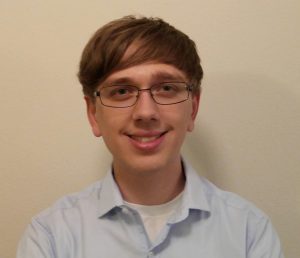 Leif Bauer, electrical engineering senior with Iowa State University’s Department of Electrical and Computer Engineering (ECpE), recently was awarded a National Science Foundation (NSF) Graduate Research Fellowship.
Leif Bauer, electrical engineering senior with Iowa State University’s Department of Electrical and Computer Engineering (ECpE), recently was awarded a National Science Foundation (NSF) Graduate Research Fellowship.
The NSF websites stated the 2,000 fellowship awardees were chosen from more than 12,000 applicants. The fellowship recruits high-potential scientists and engineers early in their careers and supports their graduate research training in science, technology, engineering and mathematics (STEM) fields, according to their website.
In his application, Bauer described his research, which focuses on Faraday rotations in magneto-optic materials. Faraday rotations are when light that shines through the material and then is rotated once a magnetic field is applied to a magneto-optic material. Bauer observed when high-speed magnetic fields were applied to a magneto-optic material, the material behaved unusually and produced a different amount of Faraday rotation than the previous case. This abnormal behavior indicated that there was something going on in these materials that the previous models Bauer studied do not explain. In his research, Bauer measured Faraday rotations by applying the high-speed magnetic pulses to create an unknown magnetic state.
By continuing his investigation in this fellowship, Bauer hopes to understand the unusual responses of the materials in order to create faster devices and better comprehend the magnetic phenomena.
“This research is important because it pushes our understanding of magnetic materials further and helps us better understand how devices act under different conditions,” Bauer said. “Magneto-optic materials have many potential applications in different fields, like reducing power consumption in fiber-optic networks, Q-Switched lasers and integrated photonics. It is also possible that this unusual behavior could be integrated into a device of its own, allowing for more adaptable fiber-optic systems.”
Associate Professor Mani Mina has worked closely with Bauer on his research for the past two years and assisted him with the application for the NSF Graduate Research Fellowship. Mina said he foresees Bauer as an important player in future discoveries in magneto-optics and quantum optics.
“Leif’s research approach is amazing, and he has a wonderfully unique process of learning, seeking knowledge, ideating and connecting fundamental concepts,” Mina said. “This has led him to pose important research questions in the area of magneto-optics and other nonlinear optical applications. I look forward to following his research progress.”
Bauer plans to pursue his graduate education at Purdue University and is excited to dive deeper into his research. He thanks Mina, Distinguished Professor David Jiles, ECpE graduate student Neelam Prabhu-Gaunkar and ECpE graduated doctoral student John Pritchard for their mentorship and guidance through his investigation.